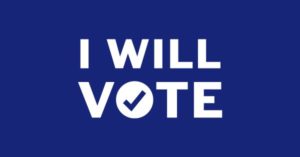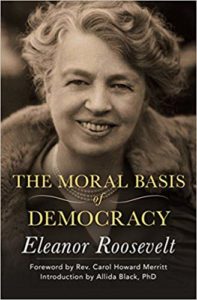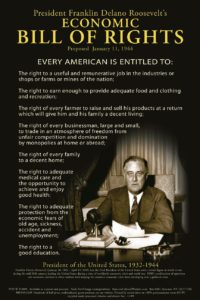“Resistance becomes duty.”
July 22, 2018Plutotic oligarchy organized as a republic…only democratic in theory if the people vote…and they typically don’t. In 2016? Turnout was the lowest in two decades…55.7% voted…48% (Hillary) To 46% (DT). The Electoral College, 538 members, elected the 45th president, a majority of 270 votes, in December of 2016.
DT received 304 electoral votes, Clinton, 227, while Colin Powell won 3 and John Kasich, Ron Paul, Bernie Sanders, and Faith Spotted Eagle each received 1.
So, in essence 304 people elected our current president.
#AbolishElectoralCollege
“When injustice becomes law, resistance becomes duty.” -Thomas Jefferson
The Moral Basics of Democracy, by Eleanor Roosevelt
With the threat of the Third Reich looming, Eleanor Roosevelt employs the history of human rights to establish the idea that at the core of democracy is a spiritual responsibility to other citizens. Roosevelt then calls on all Americans, especially the youth, to prioritize the well-being of others and have faith that their fellow citizens will protect them in return. She defines this trust between people as a trait of true democracy.
Roosevelt advances an optimistic model for the democracy of the future, and although we’ve taken some steps in the direction of her vision, it’s still a long way from reality. The issues first addressed in this 1940 essay—namely financial inequality and racial discrimination—are sadly still relevant today, as bigotry continues to undermine our national unity.
Her first publication as first lady, The Moral Basis of Democracy is an honest and heartfelt call for all Americans to choose love and faith over hatred and fear. Roosevelt takes an inspiring stance in defense of democracy, progress, and morality; the wisdom imparted here is timeless, and a must-read for every American.
“Dear God, Please bless our country at this difficult time. Protect and bless our democracy, Deliver us to a better place, And guide us to the Light That will lead us through this storm.”
Amen
-Marianne Williamson
“Remember, democracy never lasts long. It soon wastes, exhausts, and murders itself. There never was a democracy yet that did not commit suicide.”
-Will Rogers
“Democracy is threatened whenever we take it for granted.”
-President Barack Obama
‘Everybody wondered why…’
Richard Rohr, Center for Action and Contemplation
More than a theological statement that requires intellectual assent, the Eucharist is an invitation to socially experience the shared presence of God, and to be present in an embodied way. Remember, within a Trinitarian worldview, everything comes down to relationship.
First, let me share some context. In Jesus’ time, the dominant institution was the kinship system: the family, the private home. That’s why early Christians gathered in house churches, much different from the typical parish today. In Matthew’s Gospel the word house is used many times. Jesus is always going in and out of houses (as in 8:14, 9:10). What happened around the tables in those houses shaped and named the social order. Table friendship ends up defining how we see friendship in general.
Jesus often used domestic settings to rearrange the social order. Nowhere was that truer than with the meal—with whom, where, and what he ate. This is still true today, more than we might imagine. (Another example of Jesus changing the social order is in the relationship between employers and workers.) Jesus’ constant use of table relationships is perhaps his most central re-ritualization of what family means. Note that he is always trying to broaden the circle (see Luke 14:7-24 for three good examples). Jesus brought this all to fullness in his “last supper” with “the twelve.” This was not to emphasize male fellowship, but the full quorum of the twelve tribes of Israel. (I know it does not look that way to us now, but the Eucharistic meal was from the very beginning a gathering of both women and men, which shows how Christians understood equality.)
Jesus didn’t want his community to have a social ethic; he wanted it to be a social ethic. Their very way of eating and organizing themselves was to be an affront to the system of dominance and power. They were to live in a new symbolic universe, especially symbolized by what we now call open table fellowship.
In all cultures, sharing food is a complex interaction that symbolizes social relationships and defines social boundaries almost more than any other daily event. Whom you eat with defines whom you don’t eat with. Certain groups of people eat certain kinds of food. Through our choices and behavior at table, we name and identify ourselves.
This might seem like an unfair example to some, but today a vegetarian (or even vegan) diet has become a conscious choice for many because they’ve studied the politics of food: who eats meat and who can’t eat meat; what eating meat is doing not only to our health but even to the planet. Researchers surmise that the meat-heavy Western diet contributes to one-fifth of global emissions on our planet. Zen master Thich Nhat Hanh writes:
As a spiritual family and a human family, we can all help avert climate change with the practice of mindful eating. Going vegetarian may be the most effective way to stop climate change.
Jesus already showed us in practice and in ritual that the spiritual, social, political, and economic move together as one. In fact, that is what makes something “spiritual”—that is whole, combining sacred and secular, matter and spirit.
*Thich Nhat Hanh, “Blue Cliff Letter,” 2007, https://plumvillage.org/letters-from-thay/sitting-in-the-autumn-breeze/.
*Adapted from Richard Rohr with John Bookser Feister, Jesus’ Plan for a New World: The Sermon on the Mount (St. Anthony Messenger Press: 1996), 67-68, 77-79.



